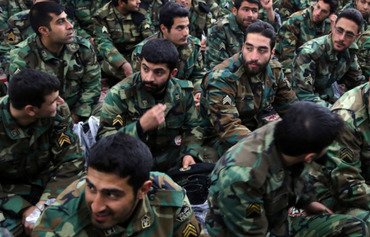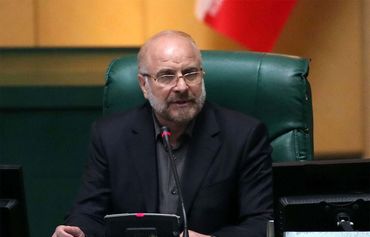A new generation of officers now wield wide influence in the chain of command of Iran's Islamic Revolutionary Guard Corps (IRGC) and have been steadily supplanting the founding generation, experts told Al-Mashareq.
Age has begun to catch up with first-generation officers, they said, noting that the names and identities of many core officers also have been exposed, which makes it difficult for them to move around and conduct operations effectively.
Many have been placed on sanctions lists or watch lists and are being monitored or pursued by intelligence agencies, according to Sheyar Turko, a researcher who specialises in the IRGC and its financing and deployment methods.
This makes their movement in areas such as Iraq, Syria and Yemen difficult, he said, and is one of the reasons the IRGC has turned to new leadership, appointing officers not known to the media or international intelligence agencies.
![Older-generation IRGC generals flank Quds Force commander Maj. Gen. Qassem Soleimani. [Photo circulated on social media]](/cnmi_am/images/2019/03/13/15449-IRGC-Qassem-Soleimani-600_384.jpg)
Older-generation IRGC generals flank Quds Force commander Maj. Gen. Qassem Soleimani. [Photo circulated on social media]
![Young IRGC officers take part in a celebration in the Iranian capital of Tehran. [Photo circulated on social media]](/cnmi_am/images/2019/03/13/15450-Young-IRGC-officers-600_384.jpg)
Young IRGC officers take part in a celebration in the Iranian capital of Tehran. [Photo circulated on social media]
This was "especially true in the appointment of Quds Force (IRGC-QF) commanders in the areas of Aleppo and Deir Ezzor", Turko said.
IRGC-QF officers "control the process of forming new militias affiliated with them, and means of financing that rely on the imposition of tributes on civilians, the smuggling of contraband and drugs and all sorts of illegal trade", he said.
"The greed, need and requirements of this new generation, which are different from the requirements of the older generation, have led them to engage in more dubious activities and special deals to get a cut of the funds," he added.
They do this by "taking advantage of the privileges they enjoy", he said, and are helped in this endeavour by their direct relationship with their counterparts in IRGC-affiliated Iraqi militias and Lebanon's Hizbullah.
Young officers edge out Iran-Iraq war veterans
"The aging of veteran IRGC officers who were involved in the Iran-Iraq war and were the founders of the corps posed a great dilemma to the IRGC," said Al-Sharq Centre for Regional and Strategic Studies researcher Fathi al-Sayed.
The departure of veteran officers, with their deep knowledge of the inner workings of the IRGC and its secrets "leaves a huge void that is the last thing the IRGC needs as it works to expand in the region", he told Al-Mashareq.
"It seems that a decision was made to turn to the second tier in the chain of command, namely the younger officers," he said.
The methods the IRGC uses to form and fund militias in countries outside Iran has "thrust younger elements and officers into key operational roles", he said.
Funding strategies involve smuggling money "and striking deals involving drugs and contraband", he said, with newer officers used "to fill essential roles in place of retired officers or those whose names and activities have been exposed".
"The clearest evidence of the influence wielded by the new generation is the appointment of Saeed Mohammed, 50, as the new president of the Khatam al-Anbiya company (IRGC-KAA)," al-Sayed said.
This appointment was made on the direct order of IRGC commander Mohammed Ali Jafari, he said, and "reflects the new reality of the IRGC, considering that IRGC-KAA is the main financing arm of the IRGC".
The IRGC-KAA has a wide presence in the region and has become "one of the largest and most widespread construction companies in the Middle East", he said, controlling hundreds of companies inside and outside Iran.
"Mohammed is an IRGC officer who has held senior positions in IRGC-KAA affiliated companies, which enabled him to move up and occupy the highest position in the company," he said.
Since the founding of the company, this position has been "reserved for senior generals of the IRGC’s first and founding generation", he added.
Division between two generations of commanders
"Despite the fact that the first tier commanders are generally annoyed by the behaviour and ideas of new generation officers, [their ascent to power] has become a reality," said strategy analyst Maj. Gen. Yahya Mohammed Ali, a retired Egyptian military officer.
This is unavoidable, he told Al-Mashareq, and has come about although many fears exist, "including the possibility of infiltration of liberalisation ideas that advocate change and reform among the ranks of these officers".
The influx of new ideas and attitudes that focus on funding rather than military experience are a reflection of what is happening in Iranian society as a whole, he said, and are partly a result of "the prevailing difficult economic conditions".
These new ideas and ways of conducting business might constitute an obstacle to "the implementation of the old generation’s political and military expansion projects", he said.
They also will have "a direct impact on the thinking of the IRGC in all its branches, particularly the Quds Force and all companies in its orbit", he added.
"It is natural for the hardline ideas to soften and be supplanted by less extreme ideas that are more accepting of others," Mohammed Ali said.
"But this has sparked a wave of opposition within the ranks of the IRGC itself between the advocates of historic [IRGC] thinking and those who hold new ideas -- a struggle that will undoubtedly shake up the stereotypical image of the IRGC and its ability to influence the Iranian street," he added.
The vigorously enforced official media blackout is a natural consequence of these shifts, he said, and is an attempt to preserve the aura of the IRGC and the legacy it has worked so hard to maintain since its founding in the early 1980s.

![Saeed Mohammed, 50, currently heads the Khatam al-Anbiya construction company, the main funding arm of the IRGC. [Photo courtesy of Sheyar Turko]](/cnmi_am/images/2019/03/13/15448-Saeed-Mohammad-IRGC-600_384.jpg)






